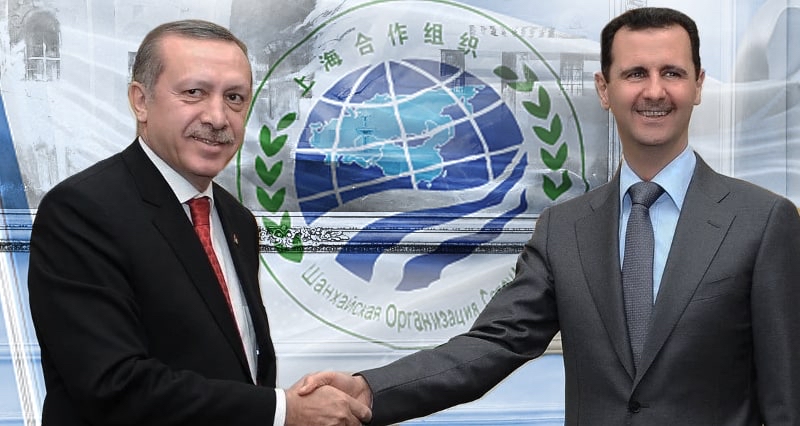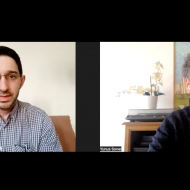By Said Ali Batrouni *
With a significant shift in Türkiye’s strategy toward the Assad regime in Syria, where he has been insisting on regime change, Erdogan stated that Türkiye’s goal in Syria is to find a political solution to the country’s decade-long civil war, rather than defeating Assad.
Ankara’s recent statement that it is willing to normalize relations with Syria has enraged the Assad opposition. They believe they have been sold out at the game of nations’ political bazaar. A photographer for the AP said Syrian protesters at Bab al-Salama had burned a Turkish flag and chanted, “Death, not shame.”
Putin’s invitations
But both presidents, Turkish President Erdogan and Syrian President Bashar al-Assad, have a lot to lose if they can’t come up with a plan on how to start new diplomatic talks. According to Iranian news agency Tasnim, it is possible to hold a meeting other than the upcoming Shanghai Cooperation Organization (SCO) summit in Uzbekistan. The 2022 annual summit of the SCO heads of the states council will be held on September 15–16, 2022.
According to Erdogan, President Putin is the godfather who initiated such an invitation.
He had asked him to attend the Shanghai summit. It turned out that Putin also invited Assad to the summit. So both Erdogan and Assad can hold a meeting together.
For President Assad, Syria has lost 911 kilometres of its northern borders to separatist factions. Putin has also been rushing Russian troops stationed in Syria to join the fight in Ukraine, which will leave the Assad regime vulnerable. Also, Kurdish militants (SDF), backed by the United States, have been stealing 14,000 barrels of crude oil on a daily basis from oil fields in Syria’s northern province of Alhasaksh, according to the Tehran Times.
Türkiye’s need for a quick diplomatic solution
President Erdogan also needs to find a definite solution quickly, as the opposition is challenging the ruling party over Türkiye’s worsening economy ahead of next year’s general elections. Almonitor, a news magazine, says that there are currently close to 3.6 million Syrian refugees in Türkiye, under temporary protection. It is estimated that Syrian refugees have cost Türkiye over $40 billion over the past 10 years. Erdogan has been threatening for a few months to launch a new military campaign to make a larger buffer zone in northern Syria and prevent the SDF from reacting so violently and overreacting. On August 11, 23 Turkish soldiers were killed as revenge by the SDF. However, Russia did not agree with Erdogan’s plan. Both President Erdogan and President Putin met twice in Tehran, Iran on July 19 and then in Sochi, Russia on August 6 and pressures for Moscow’s support proved futile. Moscow doesn’t want Assad to think less of it if it cedes more land to Türkiye in Syria.
The SDF is still Türkiye’s archenemy, as it is connected to other Kurdish militant groups such as the People’s Defense Units (YPG) and the PKK, which have been fighting an insurgency against the Turkish government since the 1980s.
Ankara and Damascus could start a new phase of normalizing their relations because the US keeps supporting the separatist ideas of the Kurdish militias, which threaten both the integrity of Syria’s territory and Türkiye’s national security.
In fact, the common interests of Russia, Syria, and Türkiye, including Iran, have converged very much against their major rivals, represented by US forces in north-east Syria, and the Russian Ukrainian war factor.
Time is of the essence for Türkiye formulating a strategic plan to limit the Kurdish SDF threat helped by the United States. In a 2019 interview with CNN in Dubai, Turkish Foreign Minister Mevlut Cavusoglu mentioned a larger conspiracy, saying that “a handful of countries, led by Israel, wanted to establish a terrorist state in northern Syria, and we thwarted their plan by launching our operation the source of peace.” President Erdogan reiterated the statement of the conspiracy to establish a Kurdish state in the northern part of the country recently, on August 5th this year when he met with President Putin at a summit in Sochi.
Many remaining questions
Despite the national interests motivation of Türkiye and Syria to normalize relations, there are still many questions to be answered and resolved. For example, how will the situation in Idlib be resolved? What are the following events on the Al-Nusrah front? Which country will Al Joulani go to? How far can Türkiye go in sabotaging Kurdish political plans without straining relations with the US, which sees the Kurds as a protective shield against the return of ISIS?
And finally, and most importantly, what is the prospective future of the Syrian opposition?
To begin with, Ankara sees that the only way out of the Syria’s current deadlock is to pursue a political settlement based on the Astana format, in which delegations from both Syria and Türkiye participate.
A new action against Kurdish insurgents in Syria is still the top priority on the Ankara agenda until Türkiye’s security concerns are resolved. However Moscow and Tehran still oppose Ankara’s military operation plan.
Türkiye’s military operation in Syria
Despite this, Türkiye insists that it does not seek anyone’s permission to pursue its campaign against the Kurdish forces in Syria. President Erdogan has played his cards diplomatically correctly. As for the three major foreign players in the Syrian conflict, Russia, Iran, and United States, Erdogan held a summit meeting in Tehran on July 18th, and he sought to link the approval of the operations with the export of the locked up Ukrainian grain, by finalizing the deal. As for the United States’ opposition to the operation, the SDF knows well that the United States will not sacrifice its relationship with a NATO member country over any type of freedom fighter movement. Erdogan might limit the scope of the military operation while pushing the YPG, for example, closer to the Damascus regime, which would ease some of Ankara’s security concerns and not bother Iran. To balance Iran as a major player in the Syrian conflict, Ankara made an effort to host Israel Prime Minister Yair Lapid to normalize ties. In addition, Türkiye has hosted Iran’s rivals Saudi Arabia and the United Arab Emirates. However, Türkiye seems determined to continue its new military operation in Syria. In an interview with the widespread newspaper, “Aftenposten”, in Norway on August 28, where he answered a question about the date of the possible Turkish military operation against “PKK / YPG” in Syria, Altun said that ensuring the safety of the lives and property of its citizens is a priority fo Türkiye. In this context, stressing the importance of regional peace and stability in the region, “Türkiye is the one who determines when an operation will be carried out in Syria.”
Turkish and Syrian chiefs of intelligence hold meetings in July
Whether Türkiye’s new military operation will go ahead in the near future or at a later date, the normalization of the Turkish-Syrian relations is proceeding at the speed of railroad trains. According to the Saudi newspaper Al-Shark Al-Awsat, Putin succeeded in persuading Assad and Erdogan to send Ali Mamlouk and Hakan Fidan, heads of the intelligence services in Syria and Türkiye, to hold secret talks in July, including in parts Sergi Shoigu.
The newspaper pointed out that Syria’s demands include stopping separatist groups in Idlib, restoring control of the Bab al-Hawa crossing road between Türkiye and Idlib, and opening “M4”, which extends from the Mediterranean border to Iraq, as well as helping Damascus to restore control over its natural resources of oil and gas, and finally surpassing US sanctions as Türkiye seeks to help Russia.
In return, Türkiye’s objectives are to launch stern actions against the PKK and its Syrian wing, which demonstrate that Damascus cannot fight the Kurds alone and that a strong collaboration between the two countries’ security services and the establishment of a buffer zone in Aleppo and other areas in northern Syria could ensure the safe return of the Syrian refugees. There have been recent leaks on social networks, including telegram, talking about President Erdogan’s decision to establish a demilitarised zone between the opposition and the Syrian regime forces. But as long as Ankara and Damascus national interests instigate the collaboration between the security services, the Syrian opposition will be abandoned or liquidated sooner or later. It is fair to say that the Syrian rebels, the opposition, has been marginalised by there foreign sponsors, and because of their ineffectiveness for over eleven years to checkmate the Assad regime after the beginning of the conflict in Syria. In short, the Syrian opposition’s future has been sealed, they have been ignored because they have failed to recapture the western attention as Ukraine was able to do. Even if the radical Islamic movement adapts a new rational, non-violent posture, Damascus will never forget that the leader of Hay’at Tahrir al Sham, Abu Muhamad Al-Julani, had tens of thousands of fighters when he controlled Idlib, and his main goal was to destabilise the Assad regime.
* Said Ali Batrouni is a journalist from Lebanon, one of the countries that have been facing the severest economic crisis in the last years. Batrouni has been working for the Los Angeles Times, Al Intishar newspaper among others and is currently Editor in Chief of the website polyprognoz.com.









Leave a Reply